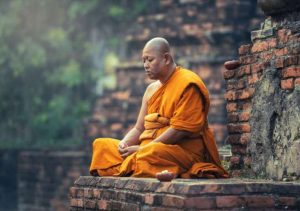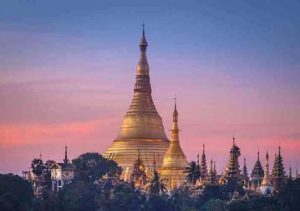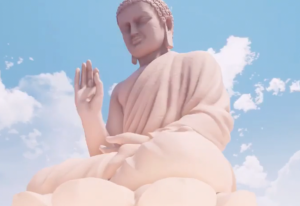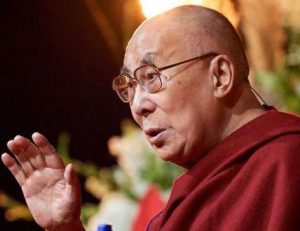The Buddha’s unusual countenance before preaching the Infinite Life Sutra
Before Shakyamuni Buddha speaks the Infinite Life Sutra, Ananda notices the Buddha’s countenance is extraordinarily majestic and brilliant, which is rare and unusual. After paying his respects, Ananda makes five remarks on these glorious features displayed by Shakyamuni Buddha, as follows:
Today, the World-Honored One dwells in the wonderful and peculiar Dharma;
Today, the World-Hero dwells in the Buddhas’ abode;
Today, the World-Eye dwells on the practices of the mentors;
Today, the World-Valiant One dwells in the supreme Bodhi Way;
Today, the One Most Honored in Heaven realizes the Tathagata’s virtue.
Ananda knows that Shakyamuni is contemplating another buddha in a profound meditative absorption and that this buddha must be very special. Then, without a question being posed to him, Shakyamuni speaks of his fundamental or original intent in appearing in the world:
As the Tathagata, I regard beings of the Three Domains with boundless great compassion. The reason for my appearance in the world is to reveal teachings of the Way and save multitudes of ordinary beings by endowing them with real benefits.
He then goes on to describe the spiritual career and purpose of the Buddha Amitabha, who is very special, unlike any other Buddha. In addition, Shakyamuni reveals that the real benefits he wishes to bestow on sentient beings are contained in the Infinite Life Sutra.
All buddhas must teach the Infinite Life Sutra at the end of their careers
In all scriptures, two conditions must be fulfilled. First, there must be an aim, and second, there must be a method outlining how the aim is achieved. For the Infinite Life Sutra, the aim is rebirth in the Pure Land, and the method is Amitabha-recitation. This is the core teaching of Pure Land Buddhism.
Referring to the five glorious features or auspicious marks displayed by Shakyamuni Buddha, we should know that the Pure Land teaching of Amitabha’s deliverance has the following characteristics:
1. The wonderful and peculiar Dharma: Pure Land Buddhism is the teaching of deliverance by “Other-Power,” the Buddha’s Vow Power, rather than the teaching of cultivation by “Self-Power.”
2. The buddhas’ abode: Pure Land Buddhism is the teaching of becoming a buddha, the highest goal of all Buddhist practitioners, rather than a teaching of becoming a bodhisattva or an arhat.
3. The practices of the mentors: Being the mentor of sentient beings, all buddhas regard the teaching of Amitabha’s deliverance as their most important bodhisattva practice.
4. The supreme Bodhi Way: The path to Amitabha’s Land of Bliss is supreme and most splendid among all paths to enlightenment.
5. Realization of the Tathagata’s virtue: Teaching the Infinite Life Sutra to sentient beings in the Six Realms is to practice the realization of the Tathagata’s virtues.
Again, Shakyamuni Buddha stated that his original intent is to teach the Infinite Life Sutra. However, it is not just Shakyamuni Buddha’s original intent, but also the original intent of all buddhas who appear in the worlds of the ten directions. Why? It is because Amitabha Buddha has accomplished his 17th Vow which states:
If, when I attain Buddhahood, innumerable Buddhas in the land of the ten quarters should not all praise and glorify my Name, may I not attain perfect Enlightenment.
Shakyamuni Buddha is one of innumerable buddhas in the land of the ten directions, so he has a mission given by Amitabha Buddha to praise and glorify his Name in the Land of Saha.
The significance of Amitabha’s 17th Vow in delivering ordinary beings
Why did Amitabha Buddha make the 17th Vow and direct all Buddhas to praise and glorify his Name?
Firstly, Amitabha Buddha attains perfect Enlightenment in a Reward Land (a purified spiritual realm manifested through the virtues of his bodhisattva practice), so he is a “Reward Buddha-Body.” Because of our karmic obstructions, we ordinary beings cannot see the Reward-Body buddhas and thus have no knowledge of them if Shakyamuni Buddha does not appear in human form and tell us in human language.
So Amitabha Buddha must rely on a “Manifested Buddha-Body” like Shakyamuni Buddha, who attains perfect Enlightenment in the manifested land (the world where we live). This is so that the Manifested Buddha-Body can introduce Amitabha Buddha (a Reward Buddha-Body) and his Land of Bliss (a Reward Land).
Secondly, Amitabha Buddha decides to deliver sentient beings of the ten directions and receive them in his Pure Land through the power of his Name, as stated in his 18th Vow. Thus, all buddhas must praise and glorify Amitabha’s Name because it enables all sentient beings who recite it to attain assured rebirth in the Land of Bliss.
Thirdly, Amitabha’s Name contains immeasurable and inconceivable merits and virtues that enable Amitabha-reciters to be reborn in the Reward Land. There, they naturally receive the same characteristics of a buddha: wisdom, transcendental powers, compassion, and so on. Therefore, among all sentient beings in the ten directions, only buddhas can fully understand the meaning and functional power of Amitabha’s Name.
Fourthly, it is a necessary and sufficient collaboration between a Reward-Body buddha and a Manifested Buddha-Body to comprehensively deliver all sentient beings of the ten directions.
Fifthly, it reveals the great of compassion of the Manifested Buddha-Body like Shakyamuni, who is willing to become a human being to praise and extol Amitabha’s Name to ordinary beings with heavy karmic offenses in our defiled land. This is an extremely challenging task.
As Shakyamuni Buddha said in the Amitabha Sutra:
Shariputra, you must realize that I have accomplished this difficult task during the period of the five defilements. That is to say, having attained the highest, perfect Enlightenment, I have, for the sake of all in the world, delivered this teaching, which is so hard for them to accept. This is indeed an extremely difficult task.
Namo Amituofo!
Related features from Buddhistdoor Global
“Do You Want to Become a Buddha Like Shakyamuni?” Asks Amitabha
How Does the Buddha Relate to Ordinary Beings?
Amitabha’s Vow-Power: The Augmentative Cause that Bestows Splendid Merit and Real Benefits












